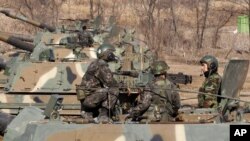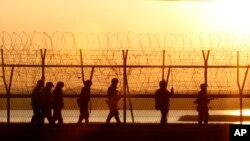SEOUL —
South Korean officials say Pyongyang seems to have made good on a threat to sever the hotline at the Panmunjom truce village as South Korea and the United States commence a joint military exercise Monday. The North is responding to the exercise by claiming it will abrogate the 1953 Armistice Agreement and threatening a preemptive nuclear strike.
As more than 13,000 American and South Korean military personnel began the Key Resolve annual joint drill, no one on the northern side of the de-militarized zone answered the routine daily 9 am hotline telephone call from the South.
The two sides have a protocol of phone contact twice daily.
A Unification Ministry spokesman says South Korea did not bother to try again to make the regular 4 p.m. call Monday.
Last week, North Korea announced it was severing the communications link, established in 1971.
South Korean officials say this is the sixth time the North has cut the line, the most recent occasion in 2010.
South Korean Defense Ministry officials say the North's senior military officer, Vice Marshal Hyong Yong Chol, made an inspection visit to Panmunjom Saturday evening.
Kim Min-seok is a spokesman for the Ministry of National Defense in Seoul. Kim says North Korea continues to make provocative threats, but the South's military is ready to strike back against any aggression.
In Pyongyang, the Monday edition of the worker's party newspaper, Rodong Sinmun, declares the armistice agreement “completely nullified from today.”
The newspaper also published a long, bellicose poem expressing that “Right now is the time to press our missile launch button targeting Washington.”
On five previous occasions - 1994, 1996, 2003, 2006 and 2009 - the North has declared it would abrogate the 1953 armistice.
-Used to coordinate movement of people for Kaesong industrial complex
-Kaesong is operated in the North with South Korean money
-North Korea cut the line in 2009, leaving South Korean workers briefly stranded in Kaesong
Red Cross Hotline
-Established in 1971
-North and South Korea would make contact two times a day
-North Korea has cut the line several times, most recently in March 2013
U.S. officials contend the military truce cannot be modified without the consent of the other signatories who led the opposing United Nations and Chinese forces.
Pyongyang has called last week's U.N. Security Council resolution strengthening sanctions against North Korea “an act of war.” The body toughened sanctions to punish Pyongyang for violating previous U.N. resolutions by conducting its third nuclear test.
In recent days, North Korean officials have also been quoted expressing the view that the Key Resolve drill is a pretext to hit the North with nuclear weapons, and thus, it must respond with a preemptive nuclear strike of its own on the United States.
Analysts point out North Korea has no proven capability to deploy a nuclear-tipped inter-continental ballistic missile across the Pacific. But they say it would not be a surprise if Pyongyang launches some short-range rockets or attempts a small scale provocation in disputed waters in the Yellow Sea. In 2010, the North rained artillery shells on a South Korean frontier island.
However, with the United States and South Korea presently displaying a show of force on and around the peninsula during the annual war exercise, some analysts predict that such a response by the North likely will not occur until after the war games end next month.
South Korean military officials, speaking to VOA on condition they not be identified, deny domestic media reports that the military exercise includes American long-range bombers, stealth fighter jets and an aircraft carrier.
The U.S. Navy's 7th fleet referred questions about the carrier's reported participation to the U.S. military's command in South Korea.
U.S. Forces Korea had no immediate comment on the South Korean media reports.
South Korea's semi-official Yonhap news agency says the country's joint chiefs of staff are playing a leading role in conducting the exercise as Seoul prepares to take control from the United States in 2015 wartime operational control of the their military forces here.
As more than 13,000 American and South Korean military personnel began the Key Resolve annual joint drill, no one on the northern side of the de-militarized zone answered the routine daily 9 am hotline telephone call from the South.
The two sides have a protocol of phone contact twice daily.
A Unification Ministry spokesman says South Korea did not bother to try again to make the regular 4 p.m. call Monday.
Last week, North Korea announced it was severing the communications link, established in 1971.
South Korean officials say this is the sixth time the North has cut the line, the most recent occasion in 2010.
South Korean Defense Ministry officials say the North's senior military officer, Vice Marshal Hyong Yong Chol, made an inspection visit to Panmunjom Saturday evening.
Kim Min-seok is a spokesman for the Ministry of National Defense in Seoul. Kim says North Korea continues to make provocative threats, but the South's military is ready to strike back against any aggression.
In Pyongyang, the Monday edition of the worker's party newspaper, Rodong Sinmun, declares the armistice agreement “completely nullified from today.”
The newspaper also published a long, bellicose poem expressing that “Right now is the time to press our missile launch button targeting Washington.”
On five previous occasions - 1994, 1996, 2003, 2006 and 2009 - the North has declared it would abrogate the 1953 armistice.
Koreas Hotline
Military Hotline-Used to coordinate movement of people for Kaesong industrial complex
-Kaesong is operated in the North with South Korean money
-North Korea cut the line in 2009, leaving South Korean workers briefly stranded in Kaesong
Red Cross Hotline
-Established in 1971
-North and South Korea would make contact two times a day
-North Korea has cut the line several times, most recently in March 2013
U.S. officials contend the military truce cannot be modified without the consent of the other signatories who led the opposing United Nations and Chinese forces.
Pyongyang has called last week's U.N. Security Council resolution strengthening sanctions against North Korea “an act of war.” The body toughened sanctions to punish Pyongyang for violating previous U.N. resolutions by conducting its third nuclear test.
In recent days, North Korean officials have also been quoted expressing the view that the Key Resolve drill is a pretext to hit the North with nuclear weapons, and thus, it must respond with a preemptive nuclear strike of its own on the United States.
Analysts point out North Korea has no proven capability to deploy a nuclear-tipped inter-continental ballistic missile across the Pacific. But they say it would not be a surprise if Pyongyang launches some short-range rockets or attempts a small scale provocation in disputed waters in the Yellow Sea. In 2010, the North rained artillery shells on a South Korean frontier island.
However, with the United States and South Korea presently displaying a show of force on and around the peninsula during the annual war exercise, some analysts predict that such a response by the North likely will not occur until after the war games end next month.
South Korean military officials, speaking to VOA on condition they not be identified, deny domestic media reports that the military exercise includes American long-range bombers, stealth fighter jets and an aircraft carrier.
The U.S. Navy's 7th fleet referred questions about the carrier's reported participation to the U.S. military's command in South Korea.
U.S. Forces Korea had no immediate comment on the South Korean media reports.
South Korea's semi-official Yonhap news agency says the country's joint chiefs of staff are playing a leading role in conducting the exercise as Seoul prepares to take control from the United States in 2015 wartime operational control of the their military forces here.






